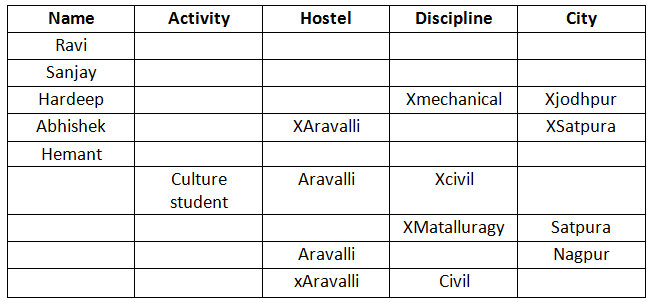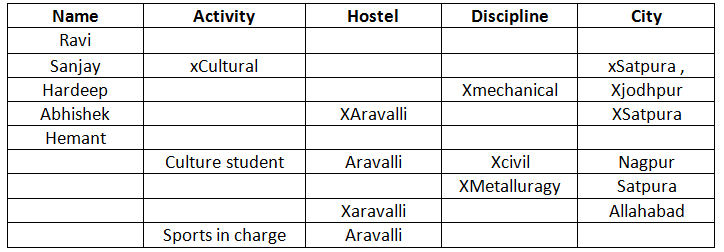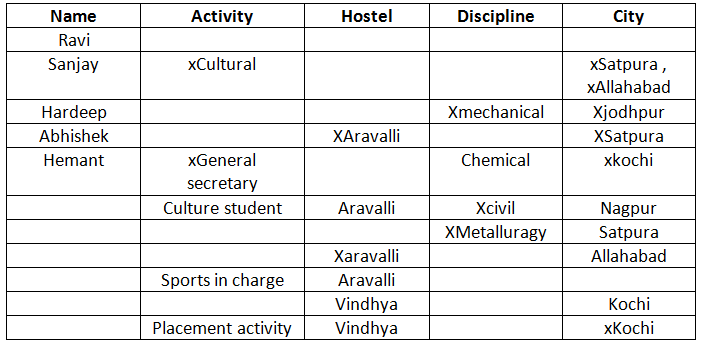SBI PO reasoning analysis: SBI PO reasoning analysis that is important to know for the exam
Fetching a desirable score in the Reasoning Ability section of an exam is easier if you have worked for it. You need to begin with the SBI PO reasoning analysis and know certain things before you begin with the topics. The SBI PO Exam is conducted in two phases- Prelims and Mains. The Prelims has a dedicated Reasoning Ability section but the Mains exam has Reasoning coupled with Computer aptitude. The topics that have been repeatedly asked in the previous exams are: Sitting arrangement and puzzles, Coding-Decoding, Passage inference, Course of Action, Machine I/O, Decoding based direction sense. The difficulty level is usually moderate to difficult with a few easy questions. Through this SBI PO reasoning analysis of the exam, strategize and plan your preparation and practice of topics.
Directions for the question set:
Read the following passage and solve the questions based on it.
In an Engineering College, five students from five different cities were elected as Secretaries by the students to perform different student activities. Each student studies in a different branch of engineering. Additionally, the following information is provided:
(i) Abhishek does not stay in the Aravalli hostel where the student from Nagpur stays.
(ii) The student, whose name is not Abhishek and does not study in Metallurgy, stays in Satpura hostel. He is the only student among the five to stay at Satpura hostel.
(iii) Hardeep neither belongs to Jodhpur, nor does he study Mechanical Engineering,
(iv) The student-in-charge of Cultural activity stays in the Aravalli hostel where Civil Engineering student does not stay.
(v) Sanjay and the student, who studies Metallurgy, both stay in the same hostel.
(vi) The student who belongs to Allahabad does not stay with the student-in-charge of the Sports activity staying at Aravalli hostel.
(vii) Sanjay is not the student-in-charge of the Cultural activity.
(viii) Ravi, the student-in-charge of Mess activity, stays at Satpura hostel.
(ix) The student from Patna and the student, who studies Mechanical Engineering, both stay at
Aravalli hostel. They are the only two among the five students to stay at this hostel.
(x) The student, who stays at Satpura hostel, studies Computer Science.
(xi) Hemant, who does not belong to Kochi, studies Chemical Engineering. He is not General Secretary of the Student Body.
(xii) Sanjay does not belong to Allahabad.
(xiii) The student from Kochi and the student-in-charge of Placement activity, both stay the Vindhya hostel.
Question 1: Which of the following statement(s) is (are) incorrect?
I. The Chemical Engineering student and the student-in-charge of Cultural activity, both stay in the same hostel.
II. The student-in-charge of Placement activity is studying Metallurgy.
III. The student who belongs to Nagpur is the student-in-charge of Sports activity.
IV. Ravi belongs to Jodhpur.
A. Only I
B. Both I and II
C. All of I, II and III
D. None of the statements is incorrect
Question 2: Which of the following statements is correct?
I. Sanjay and Abhishek stay at the same hostel. .
II. The General Secretary of the Student Body studies Mechanical Engineering.
III. The student who belongs to Patna is studying Metallurgy.
IV. The student who belongs to Kochi is studying Computer Science.
A. Only I
B. Only II
C. Only III
D. None of the statements is correct
Question 3: The student who belongs to Allahabad is studying in_______.
A. Metallurgy
B. Mechanical Engineering
C. Civil Engineering
D. None of the above
Question 4: The General Secretary of the Student Body belongs to:
A. Patna
B. Nagpur
C. Kochi
D. Jodhpur
Answers and Explanations: Click the down arrow to expand
Common solution for the set: Step 1: (consider the 1st four points) Abhishek does not stay in the Aravalli hostel where the student from Nagpur stays. The student, whose name is not Abhishek and does not study in Metallurgy, stays in Satpura hostel. He is the only student among the five to stay at Satpura hostel. Hardeep neither belongs to Jodhpur, nor does he study Mechanical Engineering. The student-in-charge of Cultural activity stays in the Aravalli hostel where Civil Engineering student does not stay.

Step 2: (consider points v, vi, vii) Sanjay and the student, who studies Metallurgy. Both stay in the same hostel. The student who belongs to Allahabad does not stay with the student-in-charge of the Sports activity staying at Aravalli hostel. Sanjay is not the student-in-charge of the Cultural activity.

Step 3: (consider points xi, xii, xiii) Hemant, who does not belong to Kochi, studies Chemical Engineering. He is not General Secretary of the Student Body. Sanjay does not belong to Allahabad. The student from Kochi and the student-in-charge of Placement activity, both stay the Vindhya hostel.

Therefore, On the basis of the above, the following table can be made:

Answers 1: (B) From the above table, the student belonging to Chemical Engineering branch stays in Vindhya Hostel, whereas Cultural activity student stays in Aravalli Hostel. So statement I is incorrect. Also the student incharge of placement activity is studying chemical Engineering. So, statement II is also incorrect. Also, the student who belongs to Nagpur is student in charge of sports activity and Ravi belongs to Jodhpur. Therefore statements III and IV are correct. Hence, option B is the correct answer.
Answers 2: (C) From the above table, it is clear that the student from Patna studies metallurgy. The correct option is (C).
Answers 3: (D) The student from Allahabad is studying in Chemical Engineering. The correct option is (D).
Answers 4: (C) The general secretary of the student body belongs to Kochi. The correct option is (C).
Extra tips for SBI PO reasoning analysis:
• Use the SBI PO reasoning analysis of the exam to prioritize your focus on various topics.
• If you are stuck on a particular question in the set, flag it for the time being and move ahead to solve other questions in the set or to other sets as it helps you cover greater amount of questions, instead of cracking fewer questions.
• Through the SBI PO reasoning analysis understand the weightage given to different topics and solve past year questions to get an understanding of the difficulty level of the problems.













